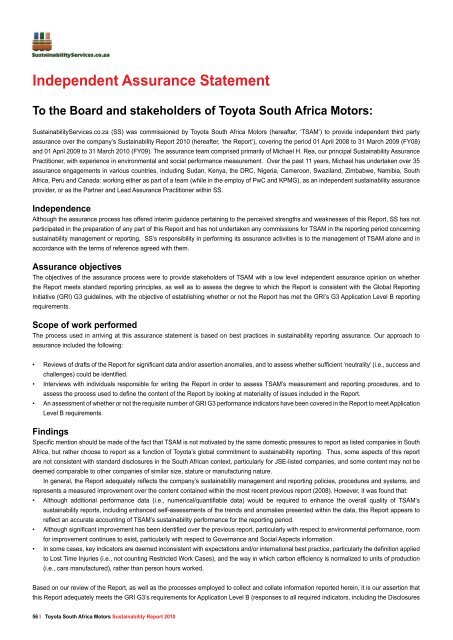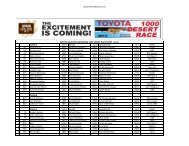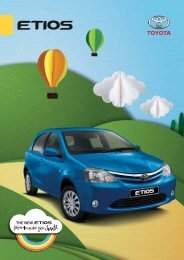to download PDF version - Toyota
to download PDF version - Toyota
to download PDF version - Toyota
You also want an ePaper? Increase the reach of your titles
YUMPU automatically turns print PDFs into web optimized ePapers that Google loves.
Independent Assurance Statement<br />
To the Board and stakeholders of <strong>Toyota</strong> South Africa Mo<strong>to</strong>rs:<br />
SustainabilityServices.co.za (SS) was commissioned by <strong>Toyota</strong> South Africa Mo<strong>to</strong>rs (hereafter, ‘TSAM’) <strong>to</strong> provide independent third party<br />
assurance over the company’s Sustainability Report 2010 (hereafter, ‘the Report’), covering the period 01 April 2008 <strong>to</strong> 31 March 2009 (FY08)<br />
and 01 April 2009 <strong>to</strong> 31 March 2010 (FY09). The assurance team comprised primarily of Michael H. Rea, our principal Sustainability Assurance<br />
Practitioner, with experience in environmental and social performance measurement. Over the past 11 years, Michael has undertaken over 35<br />
assurance engagements in various countries, including Sudan, Kenya, the DRC, Nigeria, Cameroon, Swaziland, Zimbabwe, Namibia, South<br />
Africa, Peru and Canada: working either as part of a team (while in the employ of PwC and KPMG), as an independent sustainability assurance<br />
provider, or as the Partner and Lead Assurance Practitioner within SS.<br />
Independence<br />
Although the assurance process has offered interim guidance pertaining <strong>to</strong> the perceived strengths and weaknesses of this Report, SS has not<br />
participated in the preparation of any part of this Report and has not undertaken any commissions for TSAM in the reporting period concerning<br />
sustainability management or reporting. SS’s responsibility in performing its assurance activities is <strong>to</strong> the management of TSAM alone and in<br />
accordance with the terms of reference agreed with them.<br />
Assurance objectives<br />
The objectives of the assurance process were <strong>to</strong> provide stakeholders of TSAM with a low level independent assurance opinion on whether<br />
the Report meets standard reporting principles, as well as <strong>to</strong> assess the degree <strong>to</strong> which the Report is consistent with the Global Reporting<br />
Initiative (GRI) G3 guidelines, with the objective of establishing whether or not the Report has met the GRI’s G3 Application Level B reporting<br />
requirements.<br />
Scope of work performed<br />
The process used in arriving at this assurance statement is based on best practices in sustainability reporting assurance. Our approach <strong>to</strong><br />
assurance included the following:<br />
• Reviews of drafts of the Report for significant data and/or assertion anomalies, and <strong>to</strong> assess whether sufficient ‘neutrality’ (i.e., success and<br />
challenges) could be identified.<br />
• Interviews with individuals responsible for writing the Report in order <strong>to</strong> assess TSAM’s measurement and reporting procedures, and <strong>to</strong><br />
assess the process used <strong>to</strong> define the content of the Report by looking at materiality of issues included in the Report.<br />
• An assessment of whether or not the requisite number of GRI G3 performance indica<strong>to</strong>rs have been covered in the Report <strong>to</strong> meet Application<br />
Level B requirements.<br />
Findings<br />
Specific mention should be made of the fact that TSAM is not motivated by the same domestic pressures <strong>to</strong> report as listed companies in South<br />
Africa, but rather choose <strong>to</strong> report as a function of <strong>Toyota</strong>’s global commitment <strong>to</strong> sustainability reporting. Thus, some aspects of this report<br />
are not consistent with standard disclosures in the South African context, particularly for JSE-listed companies, and some content may not be<br />
deemed comparable <strong>to</strong> other companies of similar size, stature or manufacturing nature.<br />
In general, the Report adequately reflects the company’s sustainability management and reporting policies, procedures and systems, and<br />
represents a measured improvement over the content contained within the most recent previous report (2008). However, it was found that:<br />
• Although additional performance data (i.e., numerical/quantifiable data) would be required <strong>to</strong> enhance the overall quality of TSAM’s<br />
sustainability reports, including enhanced self-assessments of the trends and anomalies presented within the data, this Report appears <strong>to</strong><br />
reflect an accurate accounting of TSAM’s sustainability performance for the reporting period.<br />
• Although significant improvement has been identified over the previous report, particularly with respect <strong>to</strong> environmental performance, room<br />
for improvement continues <strong>to</strong> exist, particularly with respect <strong>to</strong> Governance and Social Aspects information.<br />
• In some cases, key indica<strong>to</strong>rs are deemed inconsistent with expectations and/or international best practice, particularly the definition applied<br />
<strong>to</strong> Lost Time Injuries (i.e., not counting Restricted Work Cases), and the way in which carbon efficiency is normalized <strong>to</strong> units of production<br />
(i.e., cars manufactured), rather than person hours worked.<br />
Based on our review of the Report, as well as the processes employed <strong>to</strong> collect and collate information reported herein, it is our assertion that<br />
this Report adequately meets the GRI G3’s requirements for Application Level B (responses <strong>to</strong> all required indica<strong>to</strong>rs, including the Disclosures<br />
56 <strong>Toyota</strong> South Africa Mo<strong>to</strong>rs Sustainability Report 2010





